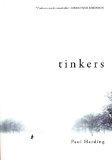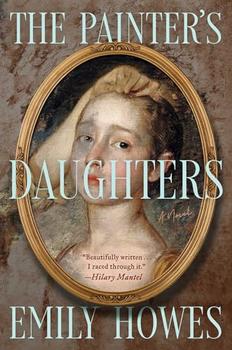Write your own review!
Harvey Fenigsohn
Paul Harding's Tinkers
The opening sentence of Tinkers, Paul Harding's Pulitzer Prize-winning novel reveals the novelist's ingenious talent. Harding tightly compresses a spring which, when released, propels his entire narrative. The compressed spring is the simple statement, "George Washington Crosby began to hallucinate eight days before he died" (7). This one, short declarative sentence thrusts forward all that follows. As we might infer from the opening sentence, the novel extends over the "eight days before he died," ending as George does. From the dying man's hallucinations, spring dreams, visions, and memories—the essence of a novel well worth reading. In Tinkers, his first novel, Harding meditates deeply about the meaning of time, memory, and mortality.
Handy, practical, and self-reliant, a quintessential American, George Crosby, one of the tinkers of the novel, once built his own home. Now, on his deathbed, "nearly a ghost" (7), he imagines his beloved construction falling apart, burying him as the whole universe collapses. Like the fallen house of the doomed man's fantasies, his mind and body disintegrate into "confused oblivion" (11). Moving smoothly from the real to the surreal, the author sounds a major theme: the impermanence of our lives, our mutability, our transience. Harding reflects on the fragility and vulnerability of all we create and all we are.
The author describes how George once sold and repaired antique clocks. These clocks become perfect symbols for Harding's concern with the inexorable limitations of time. As a skilled horologist, passionate about his work, George temporarily controlled time; "the imps of disorder are banished" (17). But the ticking of the precise machines now signals the finite limits of his time, as his organs, like the clocks he repaired, finally wind down. When George discovered that all the clocks in the room have stopped ticking, he demanded they be rewound. His grandson rewound them but it is too late for George; his time will soon be up. Harding finds a new way to tell an old truth about the killing power of time.
Harding describes an old man attempting to take stock of his life but envisioning only "a shifting mass, the tiles of a mosaic spinning, swirling ... independent now of his will, showing him a different self every time he tried to make an assessment" (18). George's sense of who he was, and who he is, now explodes into fragments of lost memory. Harding questions the puzzling nature of memory. How much does our sense of self, our very identity, depend on what we remember and understand of our past?
Through flashbacks Harding deftly weaves an account of George's present with indelible remembrances of his boyhood. George remembers that, seventy years ago, his father, Howard Aaron Crosby, the other "tinker" of the title, drove a horse drawn wagon through the New England countryside, selling dry goods and mending wares. The author relates much more of Howards' life than what George could know, but the flashback serves well as a narrative device to tell two stories at once. Transcending his deathbed delusions, George recalls poignant scenes of his childhood as the son of a father who abandoned him. It is these bittersweet memories which enable George to finally understand himself as he comes to understand and forgive his father. The author reveals the healing power of memory.
Harding's arresting language captures the hardscrabble lives of back woods farmers in the early 20th century—impoverished families driven nearly mad by the isolation of winter and the omnipresence of death: "they came to the wagon like sleep walkers: bright eyed and ravenous. Sometimes he came out of the woods with orders for a coffin - a child, a wife wrapped up in burlap and stiff in the woodshed" (12). With his control of language, Harding convinces us; we sense the verisimilitude of his settings, the authenticity of his characters.
Only Howard's reverence for the natural world relieved the drudgery of a nearly penniless tradesman. Pausing his wagon, Howard communed with nature, and imagined himself a poet. To help us sense Howard's delight in the beauty of his surrounding, Harding artfully transforms prose into poetry, "The bark of birches glows silver and white at dusk/The bark of birches peels like parchment/Fireflies blink in the thick grass and form halos around hedges."(55) These passages, alone, make Tinkers a novel to appreciate.
Howard suffered from epilepsy at a time when this disorder was little understood. Untreated, he endured unpredictable seizures and Harding's charged metaphors convey the intensity of these convulsions, "during his seizures . . . his brain nearly fried in his skull." (47). Harding describes how the attacks, striking like a lightning bolt, electrified George, granting him the intuition and insights of a visionary. But the author hardly romanticizes the disease of epilepsy as he describes "Howard's blistered brain" (47). Both brutal and tender, Harding's searing depictions of Howard's seizures realistically present the danger and pain of this disorder.
The author movingly dramatizes a scene when George's father literally and figuratively wounds his son, biting the boy's hand as George places a stick in the convulsing man's mouth. George comes to resent his father's very existence, but ultimately forgave his father, for even then, George had mixed feelings toward "a mad father whom he loved and pitied and hated" (113).
Howard also suffered a bitter wife with little sympathy for her husband's illness. Harding reveals her contempt for Howard in her cruel description of him as "a birdbrain, a magpie, a loony bird, flapping around with those fits" (20). When he discovered his wife's plan to commit him to an asylum, Howard fled, making a new life with an adoring wife.
Howard abandons his family, leaving them destitute, but Harding presents Howard's flight as an act of liberation. We see Howard redeemed by the transformative strength of love. He seems to forget his old family, but years later, the fugitive father makes one brief visit to his old family. Just before he dies, on the eighth day, George remembers that visit – comforted by his last memory of a lost father he never stopped loving. It's no accident that Harding makes George's final thoughts the memory of his father's visit. Father and son, separated for so long, finally reunite. At last, George can die in peace. So ends Harding's meditation on time, memory, and mortality.
Harding's work will not please every reader. Some will object to a novel so loosely plotted- a narrative interrupted by mystical descriptions of nature, the history and repair of clocks, the funeral of a mouse, and complete directions on how to make a bird's nest. Readers preferring the plain style will object to poetic passages of elaborate, extended sentences, one over a page long. Harding will disappoint those with little appetite for stream of consciousness narration and philosophical ruminations. They may sense a young novelist straining to express the ineffable, struggling to express that which defies language. Some readers might conclude that Harding may resemble Howard's father, a minister who went mad trying to explain the meaning of life.
Perhaps, but whatever its weaknesses, Harding's novel is an achievement. A virtuoso of style, Harding has a poet's gift for figurative language. He can evoke images of "splitting frozen wood so brittle that it rang when you split it" (23) and "the heartbreak of a cold sun" (24). He can describe wind "like a rumor, like the murmur of old men muttering" (59) and a hermit "attended by a small but avid swarm of flies "(38), choosing just the right details to change fiction into fact.
Alternating elegiac and celebratory, brooding and ecstatic registers, Tinkers becomes more than an excellent work of fiction. Rather, Harding transforms his novel into a spiritual exploration. He attempts to achieve nothing less than unveiling the secrets of our existence. That he doesn't succeed is no surprise. It is the quality of his efforts that we admire.
Dulal Al Monsur
Outer Geography and Inner Journey
Paul Harding's debut novel set in New England presents the outer realm and inner corner of both the individual and the universal man very excellently.
Lois-ellin Datta
Channeling Faulkner and Doing It Well Indeed
There's much to love about "Tinkers," most of which has been noted and with which I agree. What struck me is how much Tinkers seems to be channeling Faulkner. The linguistic precision, yes of course. The sentence-paragraphs. The discursiveness. The mingling of poetic and quotidian. The well-crafted multiplicity of voices. The mysteries of the hermit, the farmer, the farm-wives caught in lightning. A never-mawkish compassion. But most of all, the way in which past, present, and future flow into each other. In Faulkner, the themes are the taking of the land, the enslavements, and the counterparts of the sociology of Yoknapawtapha County in the minds, lives, and deaths of the descendents---even including what can seem to be the obligatory idiot son. The land is New England, the inner landscape, then Faulkner's and now perhaps Harding's. If you like Tinkers and prefer, as I do, a book about the size of "War and Peace," try Faulkner too.
Bill Boley
Workshop Work
Though Harding offers some effective stream of consciousness passages, his writing too often creates an excruciatingly slow read and many overwrought, writer's workshopish passages. Giving "Tinkers" a 4 is a push. At least it's short.
Emma
Tinkers by Paul Harding
Tinkers, by Paul Harding, is a very well written book, but at the same time very difficult for me to follow. I think that the book had great potential with a great plot, but it was not constructed in a very well manner. When I was reading summaries of Tinkers I was very intrigued, and thought it would be a good book to read. As I started reading it I just figured that it was one of those books that would be hard to get into so I decided that I would need to continue reading to really get into it, thinking that it would become clearer to me towards the end. It turned out to be completely different than what I thought it was going to be. For me it was hard to distinguish between the stories that were being told. I was never able to tell if George was telling a story about his dad, Edward, or if it was a story about one of his hallucinations. It was not that the stories were badly written, it is just that there did not seem to be much transition between stories.
For others, Tinkers might be an easier book to follow than it was for me. It wasn’t that it was a bad book, it was just a complex plot and I do not like reading books that I have to think about what is going on. I would recommend Tinkers to other readers who have an imagination while reading.
Pat Maher
average, but very good in spots
From reading the other reviews, I have to wonder if we all read the same book. I find parts of it remarkably well written, and other parts dull and without anything to recommend them. The book strikes me as a collection of ideas, not big enough for books on their own, which the author has cobbled together in this idea of tying a dying man's life and his father's life together. I cannot recommend this book. I think there are better books to spend my time reading.
Helen
Tinkers
I found this book well written but extremely boring and very difficult to get through. It's not difficult for me to understand that this author had trouble getting this published.

 Book Reviewed by:
Book Reviewed by:


